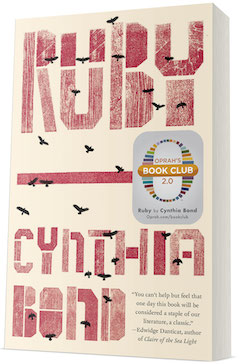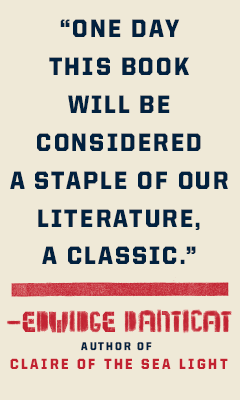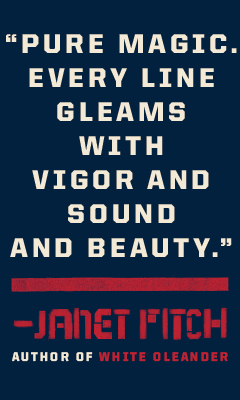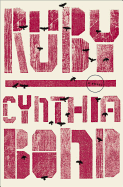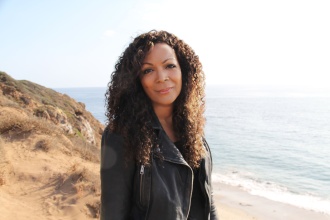Ruby
by Cynthia Bond
Memory, racism, community and the resilience of the human spirit are weighty and complex themes around which to build a story that won't suffer under their burden. Cynthia Bond's Ruby, however--lush, poetic, and brilliant in its use of imagery--manages to fully explore these elements by entrancing the reader and creating a sort of dream in which human kindness and cruelty are shown as they are--inextricable. Is love alone enough to overcome the scars of unspeakable abuse and ruin? In a debut novel that is striking in its blend of surety and sense of wonder, Bond asks and answers this question in some unexpected ways.
Ruby Bell, the titular character of Bond's novel, is "a constant reminder of what could befall a woman whose shoe heels were too high. The people of Liberty Township wove her into cautionary tales of the wages of sin and travel." With this opening paragraph, Bond tells us much of what we need to know of the world we are about to enter. Liberty is a small town in Texas, stuck in time (the actual setting is the early 1970s) and bound by its own rhythms, its difficult past and an unshakable sense of what is right and proper. The once beautiful and literally haunted Ruby, who fled the town and her own demons in the 1950s, returned some years later, her tenuous grasp on sanity slipping away soon after. By the time the novel opens, she has become the locus for all the town's fear and shame. For all, that is, but Ephram Jennings.
To the rest of the townfolk, the 45-year-old Ephram is "a moving blur on the eyes' journey to more delicate and interesting places." To older sister Celia, whom he calls "Mama," Ephram is still the boy she was forced to raise when their mother went mad and their preacher father was murdered. But one day, after witnessing Ruby urinate on the street in front of the stares of the men chewing tobacco and playing dominos outside the P&K, Ephram remembers the man he wishes to be and the girl he has never stopped loving, and makes a decision. He asks his sister to make one of her legendary "white lay angel" cakes, telling the suspicious Celia that he is taking it to a sick friend. Bond's description of the cake, which--light, sweet, precious, and coveted--becomes one of the novel's leitmotifs, is, alone, worth the price of admission:
"She made it in that pocket of time before dawn... with twelve new eggs, still warm and flecked with feathers. She washed them and cracked them, one at a time, holding each golden yolk in her palm as the whites slid and dropped through her open fingers. She used pure vanilla, the same sweet liquid she had poured into Saturday night baths. The butter was from her churn, the confectioner's sugar from P&K. And as she stirred the dawn into being, a dew drop of sweat salted the batter. The cake baked and rose with the sun."
It is this cake that Ephram, dressed in his Sunday best, wraps and tries to carry through the woods to Ruby's house, a place of nightmare and squalor. As with every hero's journey, Ephram's is fraught with danger and trial. Over the course of a day, cake in hand, Ephram falls and tears his clothes, fends off questions from everyone he passes, must gamble to retain possession of the angel cake, encounters racism and harassment from the law, and forces himself to lie about his destination. With each obstacle, we learn a little more about the history of the town, of Ruby, and of Ephram's connection to her, which involves, among other things, an afternoon with Ma Tante (one of the novel's most vividly drawn characters)--a witch, healer and wise-woman whom Ephram's father had referred to as "the Devil's midwife."
It soon becomes apparent that Ruby's madness is a product of violent and consistent abuse over many years. This abuse has manifested itself as demons and spirits and lost souls who have taken up residence within her. Bond ventures into the supernatural here but in such a natural and surefooted way that readers will be both convinced and carried along. In a very real way, Ruby is the repository for all of the town's "sin" and when Ephram finally reaches her, his steady and unshakeable goal is to wash her clean.
Naturally, Ephram's actions provoke huge resistance--not least from his sister who can't bear to lose him after sacrificing her life for him and who takes drastic measures to ensure that he stays with her--but his single-minded devotion to Ruby breaks down the barriers that have been thrown in his path. Much of Ruby involves situations and events that are dark and difficult but within and around these are also the powers of love and kindness. Cynthia Bond renders all of it with exceptional grace and insight. This is an unusual, rare and beautiful novel that is meant to be experienced as much as read. --Debra Ginsberg



